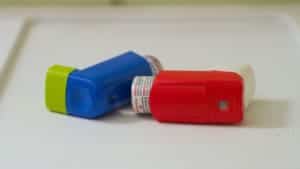We probably don’t think about our breathing much in a day. For the majority of people, ever since the doctor smacked us on our back the day we were born, they don’t think twice about breathing. Maybe you thought of it after running laps in P.E. class from that one coach who was merciless. There are multiple reasons a person may have shortness of breath, or dyspnea, that are not just related to your lungs. Science explains five reasons people have shortness of breath and how to fix it.
Symptoms of Dyspnea or Shortness of Breath
We are familiar with “catching our breath” after a workout or a hard game of basketball or other sport. Our breathing comes hard, in short, fast breaths, and we may feel a little lightheaded or weak. Our heart is probably pounding, and we are sweating. Those are some of the symptoms of shortness of breath, or dyspnea, as the medical field refers to it. Even though it stems from our exertion, it still qualifies as shortness of breath. Usually, people recover rather quickly from it and go on with their day.
Symptoms of breathing difficulty
In other cases, they have those symptoms due to various conditions. Symptoms of shortness of breath include:
- Breathing comes hard and is difficult or labored
- Chest tightness
- Fast and short breaths
- Heartbeats are irregular or fast
- The sensation of suffocation due to the inability to get enough air
- Wheezing and coughing
While Unity Point Health indicates that exercise can cause shortness of breath, if these additional symptoms accompany it, see your doctor:
- Chest feels heavy, and heart rate is high
- Chest pains, pressures or irregular heart rate
- You are pale in complexion
- Feeling that sinking sensation like you’re about to pass out or dizziness
- Passing out/fainting
- Strong fatigue
As we age, a certain amount of shortness of breath is to be expected and is considered normal. Abnormal shortness of breath occurs when you are unable to go through your daily activities without having difficulty breathing. Sometimes it even just happens when you are sleeping or lying down. Being short of breath as a 50+-year-old trying to do exercises, or other exerting activities, without having built up stamina is not considered abnormal.
We also should not confuse shallow breathing with shortness of breath. Shallow breathing is mostly associated with how we breathe in a rested state. In the same article above in LiveWell, Dr. Sandeep Gupta, a pulmonologist with Unity Health, is quoted as stating that the difference between shallow breathing and shortness of breath is:
“Technically, shallow breathing means shorter inhaling and exhaling than normal breathing but with an equal cadence. While in shortness of breath, inhalation is usually much shorter than exhalation,”
Put more simply, with shortness of breath. We are taking in less air than we are exhaling. This shortfall is why it feels as if “we can’t catch our breath.”
Acute and Chronic Dyspnea
Dyspnea can be a temporary, easily treated condition, or a long term, chronic symptom.
Acute Dyspnea
Acute dyspnea is a short period in which one may experience shortness of breath. It is usually related to a medical condition. The medical condition itself may be chronic and lead to chronic dyspnea if intervention is unsuccessful or unable to be corrected. For cases of acute dyspnea, the cause of the shortness of breath can be quickly treated. Examples of this include:
- Asthma attacks (While Asthma is a chronic condition, being short of breath is a symptom of the lungs irritated by a trigger and can be treated quickly with an inhaler, in most cases)
- Allergies to an airborne allergen or resulting in anaphylaxis shock
- COPD attacks (COPD itself is a chronic condition, but being short of breath comes and goes if properly medicated)
- Pulmonary infections such as pneumonia or bronchitis
- Heart issues such as heart attack, irregular heartbeat, heart failure
- A blood clot in the lung or collapsed lung
- Choking on something obstructing the airway passage
- Panic attacks
- Carbon dioxide poisoning
- Pregnancy
Chronic Dyspnea
Chronic dyspnea is usually related to a chronic medical condition that results in shortness of breath for weeks, months, or a lifetime.
- Various lung diseases including lung cancer, excess fluid in the lungs, T.B., inflammation of the lung tissues
- Different heart conditions
- COPD (when unable to be managed appropriately or in a progressed state)
- Anxiety disorders
- Asthma (when unable to be properly managed)
- Obesity
When should shortness of breath be cause for concern?
Sometimes, shortness of breath is the only symptom you may have for a serious condition that can be most easily treated if caught early. When should shortness of breath be cause for concern?
- A sudden or unexplained change in your ability to breathe.
- Having to decrease more activities due to shortness of breath
- Feet or ankles swell
- Unable to breath when laying down (typical of heart or lung problems)
- Flu-like symptoms: coughing, fever, chills
- Breathing creates wheezing sounds
- Unable to take full breaths
- Have pain in sides or chest when breathing or taking a deep breath
Five common causes of shortness of breath
After seeing the above list, getting short of breath may scare you. Fortunately, there are additional causes which we each have control over and can take steps to fix. Science has pointed to 5 possible reasons people have shortness of breath, and they are mostly related to abdominal symptoms.
Have you noticed that after you eat a filling meal, you have a more difficult time taking a deep breath? Maybe you have to undo the button on your jeans so you can breathe better? That is because when you eat a lot, your stomach swells, pushing on your other organs, including your diaphragm. Our diaphragm is the muscle that is under our lungs that contracts to prompt the lungs to expand and contract when we breathe. When it contracts, it pushes downwards. When your abdomen is swollen and pushing up, the diaphragm can’t contract properly, thereby limiting the motion of your lungs as well.
Some of the causes that we control, which can contribute to abdomen swelling and then shortness of breath are:
- Being severely overweight to obese
- Allergic reactions to certain foods
- Irritable Bowel disease
- Overeating fiber, drinking carbonated drinks, or using artificial sweeteners can cause excess gas.
- Acid Reflux or GERD
The connection of GERD or Acid Reflux, causing shortness of breath is due to the abdomen swelling along with slower digestion. This situation causes the acid from your stomach to rise through your esophagus. It also will cause shortness of breath from the acid going into your lungs during your sleep.
How to fix five common reasons for shortness of breath
While there can be more serious reasons behind having a swollen abdomen and shortness of breath, ask your doctor to rule out these causes if you recognize a connection. Here are some fixes you can implement:
- Lose weight if you know you are significantly overweight.
- Keep a food diary if you notice that you don’t bloat with everything you eat. Track what you eat and when the symptoms occur to isolate the cause.
- Eat smaller meals and don’t eat before bedtime
- Avoid carbonated drinks or artificial sweeteners
- Try a LOW-FODMAP diet to reduce the inflammation in your gut and rule out food sensitivities.
- Decrease high fiber, high gas-producing foods such as beans, lentils, whole grains
- Avoid or decrease processed food
Usually, the shortness of breath will improve when the food has digested and passed. Sometimes, as in food intolerances or obesity, it will take more time to decrease the pressure. A doctor should be seen should the symptoms be accompanied by:
- Severe pain
- Multiple days of vomiting
- Inability to control your bladder or bowels
- Bloody stools
 Final Thoughts on Coping with Shortness of Breath
Final Thoughts on Coping with Shortness of Breath
Developing shortness of breath can be alarming, especially as you get older or if you have a chronic breathing condition. It is essential to be vigilant and pay attention to patterns regarding our health. Noting that eating creates shortness of breath related to our abdomen swelling can give us clues about both our diet and our weight. The great thing is that if it is connected, the fix can be relatively easy with some determination, possibly some slight detective work, and a willingness to make some adjustments.

















